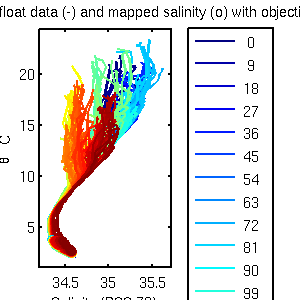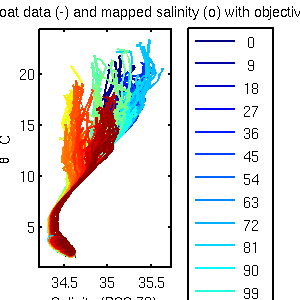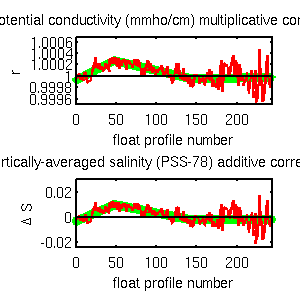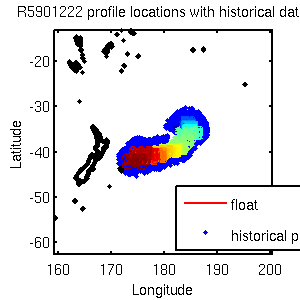
SIO Argo Site: Delayed Mode
Quality Control Tabulation Page


|
SIO Argo Site: Delayed Mode
|

|

|
| Return to sio-argo.ucsd.edu | Return to home page |
| Return to Float-Type Matrix | Return to Matrix of floats with similar ROM version |
| Raw Data Display Page | Raw Profile Dispaly Page: Quad plot of profile, T/S, waterfall and trajectory |
| Float Diagnostics | Float Diagnostics returned with each cycle by the float to monitor float health. |
| Float Metadata | Text file of float configuration/hardware upon deployment |
| Display of the floats Delayed Mode Quality Control flags
as recently reported at the GDAC. Plot may lag the GDAC by up to 10 days Colored circles represent the 1 (blue) to 4 (red) Argo QC scale. Dmode flags have value 0.5 greater than Rmode flags, so it easy to see which data has passed DMQC The dots are overlain on a waterfall plot of the profile data |

| Temperature/Salinity diagram of Quality Controlled Argo
profile data. The data is color coded by QC status (Delayed Mode or Real-Time) and goodness [Argo flag 1 (good) or other (bad)]. |

| These are the drift corrections found in the Delayed
Mode netcdf profile files at the GDAC. Error bars
are also shown. If no lines are shown, then the data has not yet passed through DMQC or the data is marked bad. |

| If present, the below figures are produced by the OW
(Owens, Wong) salinity calibration software. This software is used throughout the Argo program to access the presence of salinity drift. |
 |
 |
|
| Figure 1: Uncalibrated float measurements with historical estimates. (Click for larger image) | Figure 2: Calibrated float measurements with historical estimates. (Click for larger image) | |
 |
 |
|
| Figure 3: OW time series of correction, in potential conductivity (top) and salinity (bottom). (Click for larger image) | Figure 4: OW time series of salinities on potential temperature levels. (Click for larger image) | |
 |
 |
|
| Figure 5: Chosen levels in OW (Click for larger image) | Figure 6: Float spatial migration and historical data locations. (Click for larger image) | |